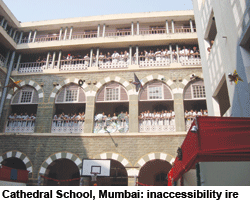Even as the school admission season has already commenced in India’s crowded (20.5 million) commercial capital, unaided minority schools exempted by the Supreme Court in its landmark judgement in Society for Unaided Private Schools vs. Union of India & Anr delivered last April from having to compulsorily reserve a 25 percent quota in class I or preschool for children from poor households in their neighbourhood, are still floundering in a sea of confusion. This because under the RTE Rules interpreted by the Maharashtra education department officials (following an enabling June 19 amendment to the RTE Act subsequent to the apex court’s judgement), all unaided-minority schools except madrassas and vedic pathashalas (institutions imparting only religious education), have to toe the reservation line.
Quite obviously narked by the prospect of Mumbai’s top primary-secondary schools such as Cathedral & John Connon, Bombay Scottish, Don Bosco, Ryan International among other top-ranked minority schools remaining inaccessible to their own and vote-bank progeny, the state education department narrowed the definition of minority schools while promising to issue a common admission schedule by November 2012, to ensure smooth implementation of the RTE Act in 2013-14. However, on December 5 the state education department asked all private schools to halt the admission process till April 2013, warning that admissions made earlier will be deemed illegal and liable for cancellation.
 According to Sridhar Salunkhe, state director of school education, the education ministry is waiting for approval of its Rules — particularly its redefinition of minority schools — by the Central government. “We never asked schools to start admission so many months in advance. They’ll have to figure out a way to start admission in April 2013. We will inform minority schools of the correct procedure for admitting quota students. Unaided minority schools will have to wait until a common admission schedule is prescribed for all schools irrespective of their affiliation,” says Salunkhe.
According to Sridhar Salunkhe, state director of school education, the education ministry is waiting for approval of its Rules — particularly its redefinition of minority schools — by the Central government. “We never asked schools to start admission so many months in advance. They’ll have to figure out a way to start admission in April 2013. We will inform minority schools of the correct procedure for admitting quota students. Unaided minority schools will have to wait until a common admission schedule is prescribed for all schools irrespective of their affiliation,” says Salunkhe.
With the Supreme Court having clearly exempted unaided minority schools from applicability of s. 12 (1) (c), their managements proceeded to commence the admission process as usual this winter. They argue that waiting until April to start the admission process will jeopardise their operations. “The state government has muddied the waters about the applicability of s. 12 (1) (c) to minority schools. The government must immediately clear this confusion. When we approached the education department, we were asked to wait till the government issues a notification. Our nursery admissions began in October, and even if the state issues a resolution now, it may be too late to implement the provisions this year,’’ says Kashmira Gundevia, principal of the Parsi minority Maneckji Cooper Education Trust school (estb. 1959).
Informed educationists in the city also ascribe this faux pas to the last-minute approach of the government. “How can a government re-interpret its Rules so late in the day, especially when they know that a large number of schools begin the admission process in November every year? A lag of so many months between a public announcement and a final procedural notification clearly indicates that the RTE Act is not really on the government’s priority list,” says Jayant Jain, president, Forum for Fairness in Education, a Mumbai-based NGO (estb. 1994).
Even as Damodar Goyal, president of the National Foundation for the Promotion and Protection of Private Education has described the state government’s interpretation of the June 19 amendment as “absurd and lacking application of mind”, some minority schools are continuing the admission process already begun, but will keep 25 percent of seats in class I vacant, to be filled in April. In the unlikely event of the Central government accepting the state government’s narrow definition of minority institutions, the reserved capacity will be allocated to poor neighbourhood children declared as such by the government.
In keeping with tradition, while government babus create chaos and confusion, school managements and parents have to simply adjust.
Praveer Sinha (Mumbai)
























